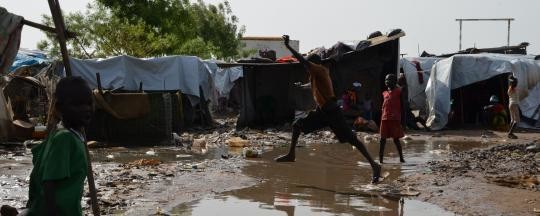The medical organization Doctors Without Borders has harshly criticized the UN Mission in South Sudan (UNMIS), led by Hilde Johnson, for ‘shocking indifference’ toward tens of thousands of displaced people sheltering at their Juba compound.
“In a shocking display of indifference, senior United Nations Mission in South Sudan (UNMISS) officials have refused to improve living conditions for 21,000 displaced people living in a flood-prone part of a UN compound, exposed to waterborne diseases and potential epidemics,” the aid charity announced today in a statement.
The 21,000 people are mostly ethnic Nuers who fear to leave the camp because of ethnic killings carried out in Juba in December. They are trapped at the camp under UN protection, cared for by aid agencies.
“Despite repeated requests from humanitarian organisations, UNMISS is taking no actions in the camp to improve their chances of survival. Médecins Sans Frontières (MSF) today questions the UN’s commitment to meeting the needs of the war-torn country’s most vulnerable groups and calls for immediate action to save lives in Tomping camp,” adds the statement.
The Tomping UN peacekeeping base, in the capital Juba, has been host to people who fled for their lives when conflict erupted in December. They are crowded into low-lying parts of the compound that are known to flood. Diarrhoeal diseases, respiratory infections and skin diseases already make up more than 60 percent of the cases in MSF’s clinic in the camp.
“A UN plan to establish an alternative site has been mired in implementation delays and is now unrealistic. Repeated requests by MSF and other organizations to expand the Tomping camp into available non-flooded space in the compound, at least as a temporary life-saving measure, have been inexplicably refused,” affirmed MSF.
Carolina Lopez, MSF emergency coordinator, says “The UNMISS decision not to improve conditions in Tomping is shameful. In the first rainfall of the season 150 latrines collapsed, mixing with floodwater. People are living in natural drainage channels as there is no other space and there are 65 people per latrine.”
“The rains, which will last the best part of six months, are getting heavier and if nothing is done right now the consequences, already horrific, could become fatal. Whether as a permanent or as an interim solution, expanding into the dry parts of the compound has to be an immediate action,” added Lopez.
On April 3, Hilde Johnson, head of UNMISS, stated herself that the Tomping camp is ‘at imminent risk of turning into a death trap’. She then announced that it will be closed in May. However, only 1,118 residents have been moved over the past 5 weeks.
MSF says the plan is no longer a valid option, because 20,000 people cannot be moved to an unprepared site by May. The organization contends that this plan is now ‘unrealistic.’
“In the meantime, it is hard to understand why available space in Tomping cannot be used to save lives,” says MSF.
Lopez, the emergency coordinator states, “They say there is not enough space in Tomping, but this is a sickening argument when on the other side of the barbed wire there are dry parking and storage spaces.”
Photo: Aurelie Baumel/MSF
Related coverage:
Doctors expect ‘huge spike in malaria cases’ at Tongping camp (20 March)
Scramble to decongest Juba camps after first rains (18 March)
Excerpts: UN report on the killings in Juba, South Sudan (26 February)
‘They just started shooting at us’ (20 Jan.)




